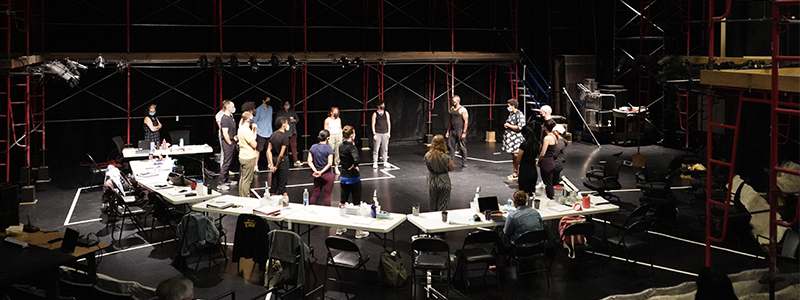Process and Evolution

Since April 2020, Abigail Henkin, then student and now UChicago graduate, has been working on the creative team for Court Theatre’s upcoming production of The Tragedy of Othello, the Moor of Venice. During that time, the team’s approach to the play has evolved as its members process social upheaval and discover creative possibilities during production meetings.
For over a year, a series of private salons have been orchestrated among Court creatives like Henkin, who is Assistant Director and Associate Dramaturg of the production. The salons present an extraordinary opportunity for collaboration between designers, directors, actors, dramaturgs, and anyone else on the team who has a unique idea to share. The purpose of these sessions, Henkin declares, is “pretty all-encompassing” as they offer a virtual space for the artists to discover the vision of the production alongside its co-directors, Marilyn F. Vitale Artistic Director Charles Newell and performance scholar and Northwestern PhD Candidate Gabrielle Randle-Bent.
A critical decision that the team arrived at early in the process was to re-center the character of Othello in a play that is often overrun by Iago. The question “What is the tragedy of each of these characters?”, particularly female characters who are often overlooked or underestimated, was vital to their discussions. However, putting Othello at the forefront was also paramount. Changing the production title from “Othello” to its original complete title “The Tragedy of Othello, the Moor of Venice” was a pivotal step on that journey of centering a character who is often written over in favor of Iago in several traditional performances. Such a trend can be attributed to Shakespeare’s text itself, as numerous asides and frequent lines ensure that Iago has a greater textual presence and power in the play than Othello. Considering Shakespeare’s construction of the text, Iago tends to take over unless a production intervenes through its staging. Court’s production aims to recenter Othello. Each word in “The Tragedy of Othello, the Moor of Venice” is necessary because, as Henkin says, it “tells something about the character and what world he is occupying.” Furthermore, the title change also demonstrates the team’s commitment to work beyond the typical assumptions surrounding the play and break free from the developed traditions that often dictate how characters in this play are typically performed.
The acknowledgment of “Venice” in the title also manifests the team’s attention to the location as a presence that can be evoked even when the production is not strictly grounded in 1500s Venice. Emerging from Henkin’s in-depth dramaturgical work was the realization that Venice was a place of cultural diversity as a meeting place between the East and West, and that revelation has informed casting and design decisions. A variety of documents informed Henkin’s knowledge of Venice as a complicated yet lively society and how the tensions within it still resonate today.
Henkin’s role as Associate Dramaturg meant that she was often in pursuit of resources, and the pandemic context during which this production has been conceptualized means that her research has been conducted online. That virtual condition has not stopped Henkin from finding fascinating texts that have become integral to shaping the production. A few resources that stood out in Henkin’s memory include texts from Professor Noémie Ndiaye’s Black Shakespeare class and the Court coordinated series Black Baroque, such as Debra Ann Byrd’s Becoming Othello: A Black Girl’s Journey and Keith Hamilton Cobb’s American Moor to challenge the stereotypical expectations of an Othello performer. Other sources were Margaret F. Rosenthal’s The Honest Courtesan: Veronica Franco, Citizen and Writer in Sixteenth-Century Venice to think about Bianca and the portrayal of women, and Toni Morrison’s Desdemona, discussed alongside Professor Ndiaye, also was helpful in exploring the bonds between Iago and Othello and Othello and Desdemona. Such texts further prompted the team’s commitment to treating each character as a complex human being who has a life beyond the play’s pages. Henkin reveals that a significant realization was “you can’t hate anyone without a strong emotional connection.” That discovery marked a transitional moment in understanding the characters as starting from a place of profound love and deep human connection rather than jealousy. The creatives have applied this understanding to their long-standing goal of, as Henkin puts it, “breaking assumptions about these characters” and “telling this brutal story in a way that is healing instead of reinscribing trauma.”
The process of creating The Tragedy of Othello, the Moor of Venice has been a unique experience due to its pandemic context. Henkin notes that the team has not yet assembled in-person for their meetings, but that she looks forward to meeting everyone, following COVID guidelines, for the first rehearsal. The production also has an unexpected advantage: since there are no shows before it, the team gets to rehearse in the assembled set onstage. This scenario provides incredible opportunities for new creative discoveries that come with interacting with the physical space from early on in the rehearsal process.
When asked how these salon sessions have influenced her as a creator, Henkin shares how much it meant to her that everyone’s perspective was given space to be aired. “It was incredibly rewarding to be respected coming in as a student and having my voice as a professional heard by the thoughtful leadership of Charlie and Gabby,” Henkin says. This production marks the incredible start of Henkin’s professional artistic journey and Court Theatre’s transition back to live performances.
Learn more about The Tragedy of Othello, the Moor of Venice, and buy your tickets today →
Photo of the company of THE TRAGEDY OF OTHELLO, THE MOOR OF VENICE in rehearsal (Ervin-Eickhoff).